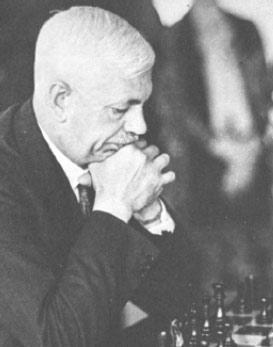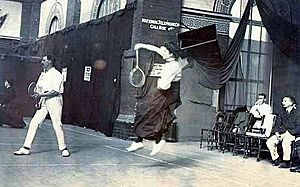Sir George Thomas, 7th Baronet facts for kids
 |
|
| Full name | George Alan Thomas |
|---|---|
| Country (sports) | |
| Born | 14 June 1881 Tarabya, Istanbul, Ottoman Empire |
| Died | 23 July 1972 (aged 91) London, England, U.K. |
| Singles | |
| Career record | 320–156 (67.2%) |
| Career titles | 26 |
| Grand Slam singles results | |
| Wimbledon | QF (1911) |
| Doubles | |
| Grand Slam doubles results | |
| Wimbledon | SF (1907, 1912) |
| Mixed doubles | |
| Grand Slam mixed doubles results | |
| Wimbledon | 2R (1920, 1921) |
Sir George Alan Thomas (born June 14, 1881, died July 23, 1972) was an amazing British athlete. He was a top player in three different sports: badminton, tennis, and chess! He became the British chess champion twice. He also won a record 21 titles at the All-England badminton championships.
Sir George reached the quarterfinals in singles tennis at Wimbledon in 1911. He also made it to the semifinals in men's doubles tennis that same year. The world championship cup for men's badminton teams, called the Thomas Cup, is named after him. This shows how important he was to the sport.
Sir George lived most of his life in London and Godalming, England. He never married. Because of this, his family title (baronetcy) ended when he passed away.
Contents
Badminton Achievements
Sir George Thomas is known as the most successful player ever at the All England Open Badminton Championships. This event is like the unofficial world championship for badminton. He won an amazing 21 titles between 1903 and 1928.
All-England Titles
His titles include:
- Four in men's singles (he won these four years in a row from 1920 to 1923).
- Nine in men's doubles.
- Eight in mixed doubles.
He won titles both before and after World War I. The competition was paused from 1915 to 1919 because of the war.
Promoting Badminton
In 1925, Sir George was part of the English team that visited Canada. Their goal was to help make badminton more popular there. The Canadian Badminton Association had just started in 1921.
He was also the team captain for a second tour in 1930. During this tour, England played a match at the Granite Club in Toronto. England won the match with a score of 7–2.
International Badminton Federation
In 1934, Sir George helped create the International Badminton Federation. This organization is now called the Badminton World Federation. He was the president of this important group from 1934 to 1955.
The Thomas Cup
Sir George had a great idea for badminton. He was inspired by tennis's Davis Cup and football's World Cup. He wanted to create a big international competition for national badminton teams.
In 1939, his idea was very popular at a meeting of the International Badminton Federation. That same year, Sir George gave the federation a special trophy. It was called The International Badminton Championship Challenge Cup, but it's now known as the Thomas Cup.
The Cup was made by Atkin Bros of London and cost £1700. It is 28 inches tall and 16 inches wide. The trophy has three parts: a base, a bowl, and a lid with a player figure on top.
The first Thomas Cup tournament was planned for 1941–42. However, World War II delayed it. The first competition finally took place in 1948–49. Ten national teams competed in this historic event. Even though the Cup has British origins, England's best finish in the Thomas Cup was third place in 1984.
Hall of Fame
In 1996, Sir George Thomas was honored for his amazing contributions to badminton. He was one of the first people to be included in the World Badminton Hall of Fame.
Chess Achievements
Sir George Thomas was also a very strong chess player. He won the title of British Chess Champion twice. He achieved this in 1923 and again in 1934.
Playing Against Champions
In 1934/35, he shared first place at the Hastings International Chess Congress. He tied with Max Euwe, who later became a world chess champion. He also tied with Salo Flohr, a top player from Czechoslovakia.
Sir George finished ahead of two famous world champions: José Raúl Capablanca and Mikhail Botvinnik. He even beat both of them in their individual games! For Capablanca, this was his first loss in a tournament in four years. It was also his first loss playing with the white pieces in over six years.
Eleven years later, at another Hastings tournament, Sir George beat Max Euwe. This meant he had defeated three different world chess champions in games.
International Recognition
In 1950, Sir George was given the title of International Master by FIDE. FIDE is the world chess organization. In 1952, he also became an International Arbiter. This means he could be a judge in important chess tournaments. He stopped playing competitive chess when he was 69 years old.
 | Calvin Brent |
 | Walter T. Bailey |
 | Martha Cassell Thompson |
 | Alberta Jeannette Cassell |


